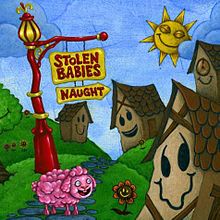
Album Review: Stolen Babies - Naught
It's hard to remember sometimes that music is in fact art, and the songs and albums we listen to are supposed to be artistic expressions of the people who create them. Music has taken many turns over the years, and all but a few of those movements have ended up with a more commercialized product, records that aim more to please fans and bring in profits than they do give life to creative impulses. That's not to say that the vast majority of musicians are just doing it for the money, but for all but a few, every decision they make is ultimately filtered through a lens other than that of a pure artist.
But there are still segments of the population who take art seriously, and who want nothing more than to quantify their dreams and inspirations. Often, these artists are shunned for being outside the mainstream, given only as much attention as their token commercial songs will vouch for. The rest of the time, they live and perform in the shadows, often under the pejorative term 'avant-garde'. We should have more respect for artists who shun the easy way out and follow their muse wherever it may lead, but we don't. We prefer to have our music wrapped up in a neat little box and delivered to us like a junkie tapping a vein.
Stolen Babies wants no part of the crass nature of modern music. They are performance artists as much as they are musicians, making an audio version of a gallery showing. Nothing about the music on “Naught” is going to make Stolen Babies popular, which is exactly what will lead to their success. There is so little music in the popular metal scene that allows itself to think differently that Stolen Babies have found a niche simply by being honest about who they are and what they want to do.
“Never Come Back” opens the album with a mixture of rasped screams, a marching beat, and a gothic sensibility that is seldom put together in such a manner. It's an interesting take, and leads into an album that takes flights of fancy, and returns with a heaping pile of frequent flier miles. “Splatter” somehow merges a Devo-esque riff with an acoustic lullaby and jangly chords that remember the short time that Franz Ferdinand was relevant, and manages to cohere them into a song. That's not an unimpressive feat.
The trip into the unexpected continues with burning old-time jazz on the short palate-cleanser “Behind The Days”, leading into the Tim Burton via death metal “Mousefood”. Blastbeats may have never sounded quite so theatrical. But somewhere along the line, as expected, the surprises begin to evaporate. Keeping the listener off-balance isn't easy over the course of an entire record, and the back half of “Naught” can't keep up the twists and turns of the first half. “Swimming Hole” is another gorgeous recreation of a bygone musical era, but we had already heard something similar a few songs previous, which negates the pirouette being done.
Ultimately, “Naught” brings up two distinct feelings for me. As an artist myself, I laud anyone who dares to follow their muse, even when it means limiting the audience who may appreciate the music. “Naught” is full of inventive ideas and creative wandering, all of which should be interesting to anyone who appreciates outside the box thinking. But this is music we're talking about, and art or not, it needs to work as music. I'm not sure that “Naught” does that, since there is very little about the album I would want to return to again and again. The ideas and sounds are all there, but they don't prop up a set of songs that stick with you. Much like impersonators, the window-dressing is excellent, but the core is lacking the weight to make “Naught” more than a novelty.

